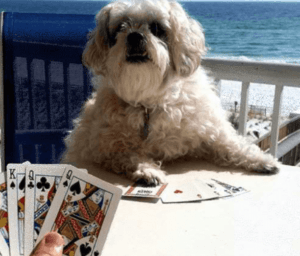Card Games To Keep Your Mind Sharp And Brain Healthy
This is writeup of a recent article in Home Care Assistance entitled “Promote Cognitive Health with Brain Games for Seniors”.

Many of our readers have expressed an interest in the topic of “Aging Well” and “Brain Games for Seniors”, therefore we are pleased to present this writeup, in honor of September – the Healthy Aging Month.
Aging well
Researchers continue to believe that playing “brain training games” can help keep the mind sharp. They may not prevent the brain from normal aging, but they can help keep a brain healthy, alert and finely tuned. These mentally stimulating games can play an important role in aging well.

Mentally challenging brain games — cards, puzzles and board games — are good for seniors who may have mobility issues. They don’t involve a lot of physical activity. In addition, they are intellectual and social forms of stimulation and are a lot of fun.
The Importance of Brain Games for Adults
Studies have demonstrated that card games, puzzles and board games are good mental stimuli and that they help promote brain health.

This is especially true for older adults. Games also stimulate the immune system and can trigger the use of visualization, memory and sequencing skills.
Many of these games involve socialization and verbal interaction. We know that games can also help mitigate boredom and depression (both of which can cause cognitive decline). They can turn into fun activities that involve family and friends (a social dynamic that also helps keep the brain active and engaged).
Best Card Games for Brain Health
Experts on aging like to say that “playing your cards right” can help keep your mind sharp long after retirement. While this is a play on words, they’re right. Playing card games can improve short-term memory as well as long-term memory. There are cards games of varying difficulty levels you can choose from:
- Bridge. The best card games are those that demand memory, strategy and attentiveness. Bridge is one such game. It teaches logic, reasoning, quick thinking, patience, concentration and partnership skills. Bridge also involves at least 4 people so there is a valuable social component to the game as well.
- Go Fish. Card games don’t have to be as complex as bridge to help with mental acuity. Even simple card games like Go Fish help exercise the brain.
- Gin Rummy. This is an old favorite that’s easy to learn but requires careful attention. A player needs to track what cards have picked up and which have been discarded.
- Poker. Organize a poker night for your family and make sure your parents come! Play games like 5 Card Draw or Texas Hold ’em.
- BlackJack. These card games can be a lot of competitive fun. They also require concentration and visual memory.
- Solitaire. Even a game of Solitare can be a good brain game. However, card games that involve others also promote socialization. This interaction with others is known to help promote brain health as well as emotional well-being.
Other Great Games for the Brain

The New England Journal of Medicine studied people over the age of 75 who engage in brain-stretching board games. These people were less likely to develop dementia than their peers who didn’t play these games. Some great games that are good exercises for the brain are:
- Checkers. A classic game that can be played with grandkids.
- Chinese Checkers. Work the problem-solving muscle by figuring out how to move the marbles when moves seem limited.
- Mahjong. Popular with the ladies and strategically demanding.
- Backgammon. This game requires critical thinking to beat your opponent.
- Dominos. This requires thinking ahead and concentration.
- Bingo. A simple game but one that usually involves a lot of other people which is an added advantage.
- Chess: Probably the most mentally challenging board game. There are groups that meet up to play chess, which is great for meeting new people.
- Scrabble. Word games like Scrabble require creativity and the ability to recall words.
- Crossword puzzles. If you or your loved one are new to crossword puzzles, you don’t need to start with the rather daunting New York Times puzzles. Try a book of simpler crossword puzzles to tackle as you master the art of the crossword.
- Sudoku puzzles. If numbers are more your thing, try solving one of these great logic puzzles.
- Jigsaw puzzles. These are both visually as well as mentally stimulating.
- Word searches. Buying a book of these can provide hours of entertainment.
- Brain teasers. Buying a book of riddles is another fun game. Your loved one can solve them by themselves or use it as an activity with grandchildren.

We hope you’ve enjoyed our writeups on the articles “Promote Cognitive Health with Brain Games for Seniors” and “Strategies for Aging Well During Healthy Aging Month”. We would love to hear your thoughts about these two articles, so please leave us a comment on the website.
Other brain games can be found under the heading “See Our Blogs”, by clicking any of the published blogs on the pages for the following categories:
“Brain Games For Children”
“Brain Games For Adults”
“Brain Games For Seniors”
“Advanced Brain Training”
“Optimal Brain Health”


I have always liked board games. But I had never been into chess. I had never given it a try. But with the success of Queen’s Gambit, my friends started playing chess and I joined them a couple of times until I got hooked. I find myself researching about strategies and stuff that I never imagined I would be looking up, LOL!
Thanks for your comment, Ann! Glad you like chess… It is certainly a good exercise for the brain. Happy you liked our blog.